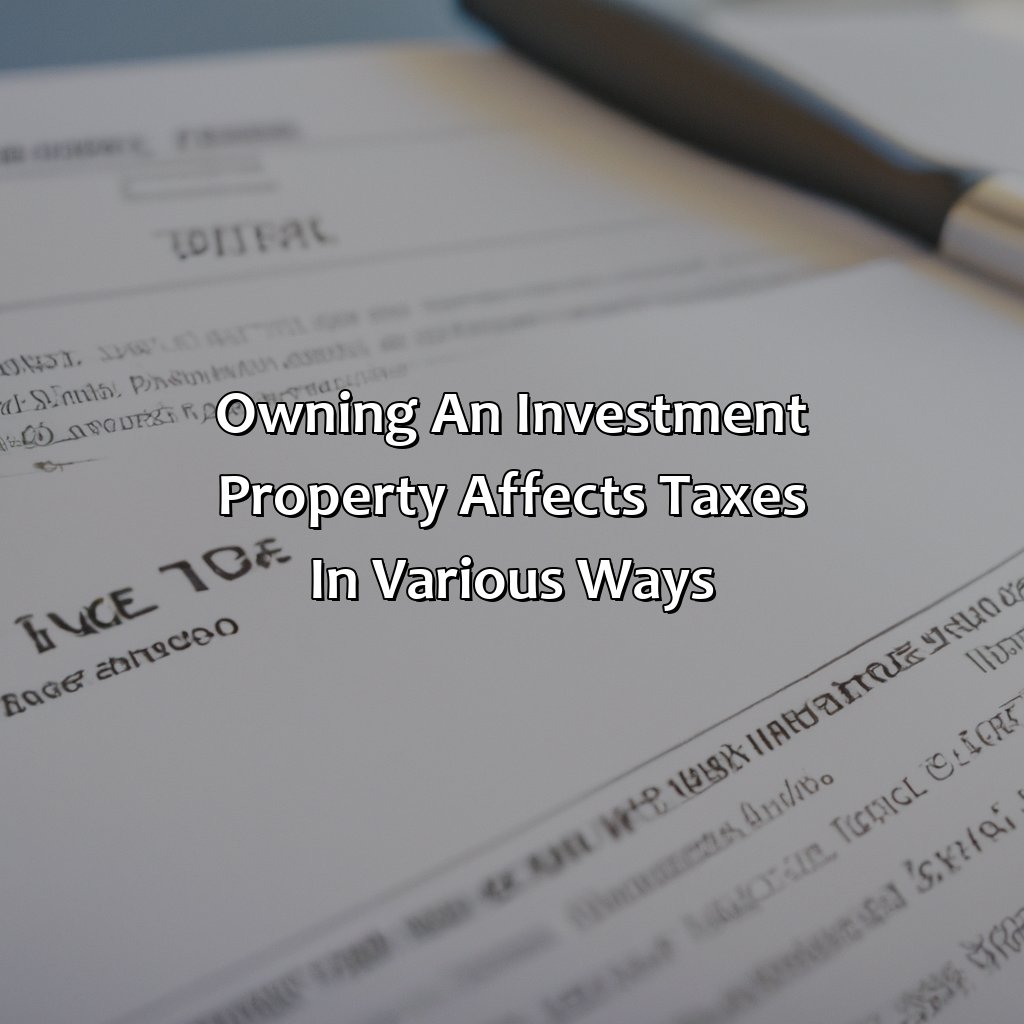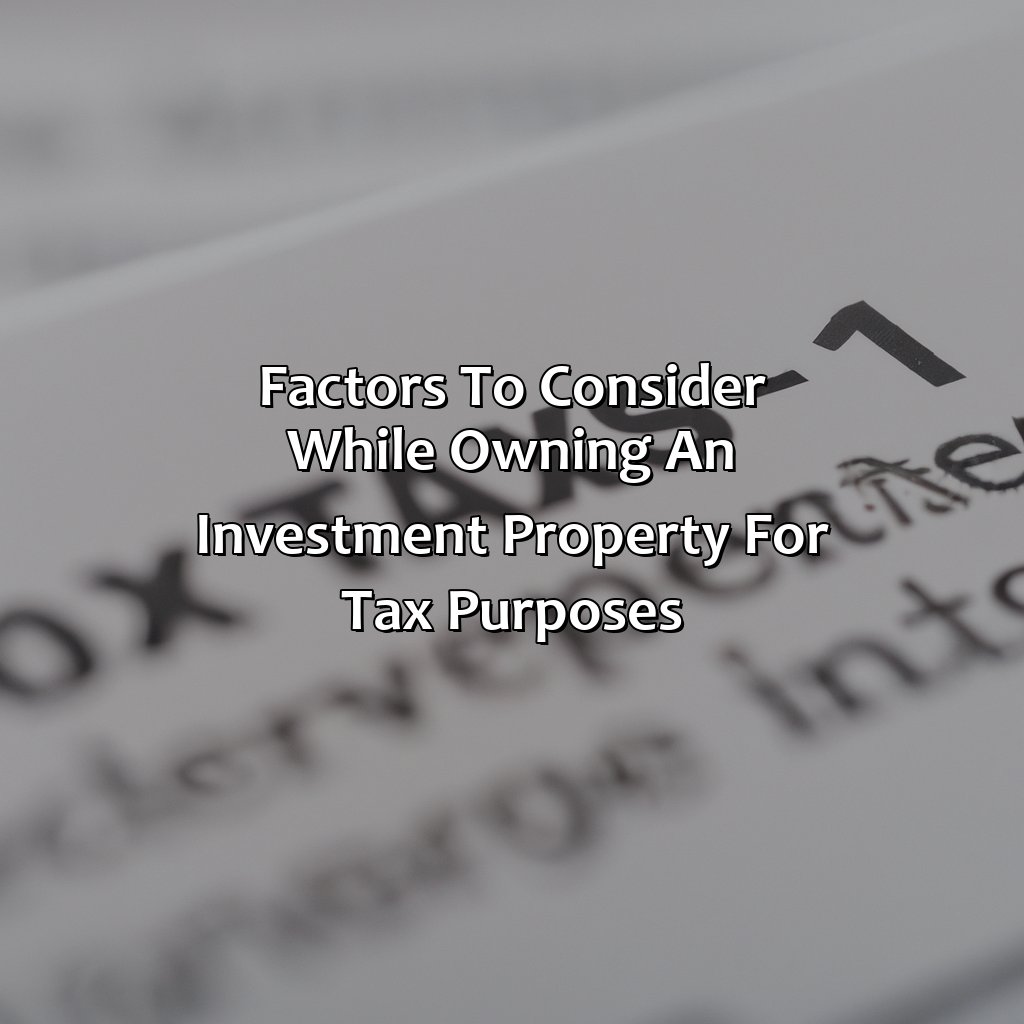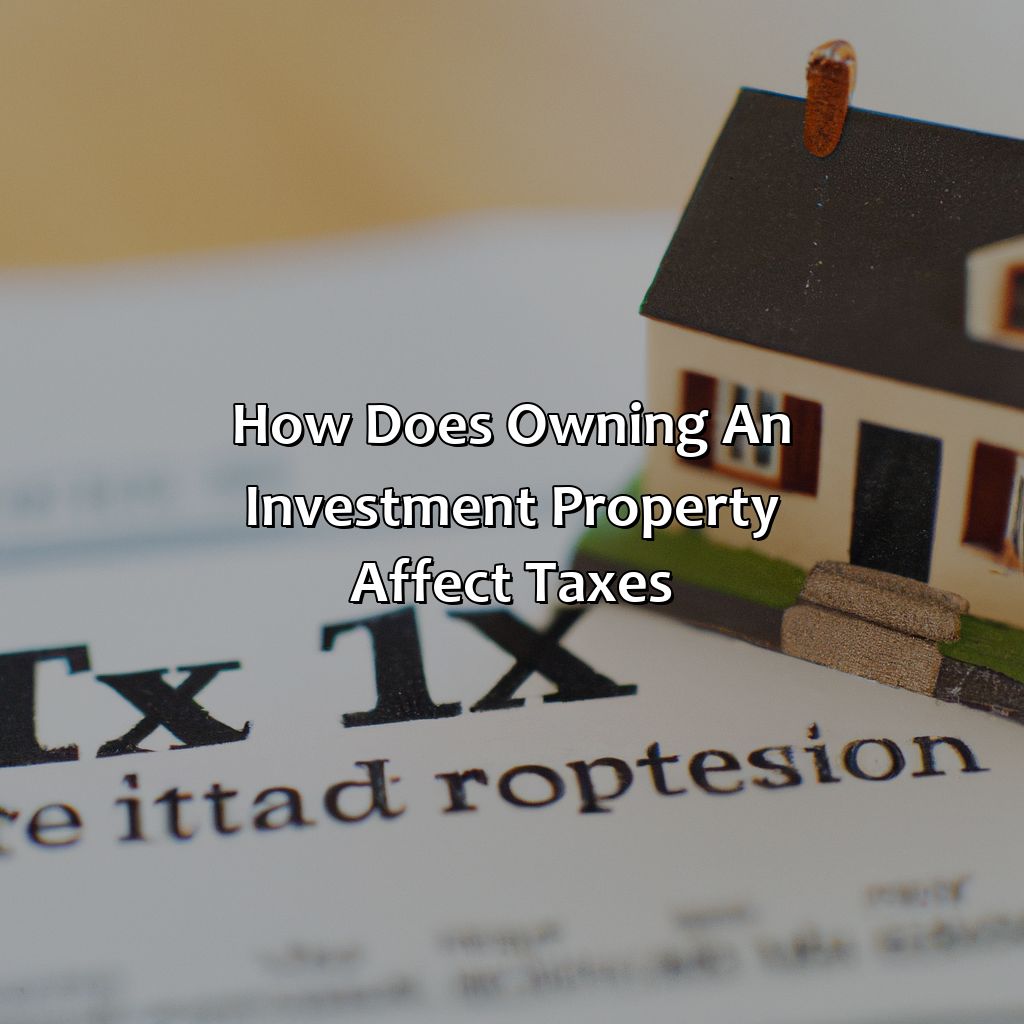How Does Owning An Investment Property Affect Taxes?
Key Takeaway:
- Owning an investment property affects taxes in several ways, including rental income tax, property tax, depreciation tax benefits, mortgage interest tax deduction, and capital gains tax on sale.
- When owning an investment property, it is important to consider factors such as the type of property owned, rental income and expenses, capital gains and losses, and tax implications of rental property ownership.
- To maximize tax benefits and minimize tax liability, property owners should keep accurate records of income and expenses, take advantage of available tax deductions and credits, and consult with a tax professional for guidance.
Are you a property investor looking to manage your taxes? Read on to learn how you can minimise your tax obligations when owning an investment property. With the right strategies, you can keep more of your hard-earned money.
Owning an investment property affects taxes in various ways
Gain insight into how owning an investment property affects your taxes. Look into the various taxation components connected to it. Rental income, property tax, depreciation tax benefits, mortgage interest tax deduction and capital gains tax on sale all have an effect on your taxable income. Familiarize yourself with each of these areas to understand your tax obligations and maximize the returns on your investment.

Image credits: retiregenz.com by Adam Duncun
Rental income tax
When owning a property for rental, the income received is subject to taxes. The tax liability may vary depending on various factors such as property ownership structure, rental income amount, and expenses incurred. Rent received from a rental property is typically considered as taxable income.
Furthermore, unique tax benefits are available for investment properties, including deductions on expenses such as mortgage interest payments, repairs and maintenance costs.
Owning an investment property affects taxes in various ways. One can use tax depreciation to reduce the tax they owe each year they own a rental property. Depreciation gives owners a legal way to reduce their taxable profits when they own an investment property while still benefiting from its appreciation.
Interestingly, the US presidential candidate Joe Biden proposed changes in key areas of taxation that could directly impact investors with investment properties. Biden’s plan proposes increasing capital gains taxes for those who earn over $1 million several times by close to 40%, aiming to increase Federal revenue by about $90 billion per year.
A True History: In 1986, President Ronald Reagan signed the Tax Reform Act which ended most profitable real estate tax shelters offered through limited partnerships. This move encouraged more individuals to invest directly in properties themselves rather than relying on pooled funds; hence creating a boom in single-family residential real estate investments.
Owning an investment property means paying property taxes, but at least you can count it towards your annual cardio.
Property tax
Taxes on investment properties are subject to the jurisdiction of local governments, known as property assessments. These taxes are based on the value of the property and its improvements, such as buildings or landscaping. Failing to pay property tax levies penalties and can result in a lien on your property, which could lead to foreclosure.
Deducting expenses related to your investment property is another way taxes come into play. Expenses include mortgage interest, property taxes already paid, depreciation, repairs and maintenance. These deductions reduce your taxable income on Schedule E.
To minimize taxes further you may consider restructuring the ownership of the investment property or investing in Low-Income Housing Tax Credits (LIHTCs). A 1031 exchange is another option for deferring capital gains tax by investing in like-kind properties within a certain time frame. Consult a tax attorney or CPA before making any decisions on changing ownership structures.
Owning an investment property is like having a high-maintenance spouse, but at least with depreciation tax benefits, you can write off some of the expenses.
Depreciation tax benefits
One of the advantages of owning an investment property is that it comes with depreciation tax benefits. Depreciation refers to the decrease in value that a property or asset experiences over time due to wear and tear, aging, or obsolescence. This decrease in value can be used as a deduction on your tax return, reducing your taxable income. The amount of depreciation you can deduct depends on the cost of the property and its useful life.
By taking advantage of depreciation tax benefits, you can reduce your overall tax liability while still earning rental income from your investment property. It’s important to note that depreciation deductions only apply to certain types of expenses related to the property, such as structural improvements or appliances that have a limited useful life. Deductions for land or for repairs and maintenance do not qualify.
In addition, keep in mind that if you sell the investment property down the line, you may face recapture taxes on any depreciation deductions claimed over the years. This means you’ll have to pay taxes on any gain resulting from those deductions when you sell the property.
Pro Tip: Consult with a tax professional familiar with real estate investments to ensure you’re maximizing your depreciation deductions without running into any potential issues later on during a sale.
Turns out owning an investment property is not only a great way to make money, but also a great way to deduct all your Starbucks runs as ‘business expenses’.
Mortgage interest tax deduction
Investors may claim tax deductions on the interest paid while servicing their loan for an asset purchased to generate rental income. This deduction is known as the ‘Interest Expense Deduction’ and can be claimed in the same tax year that the interest was accrued.
The amount of this deduction depends on various factors, such as the size of the mortgage, interest rate, duration of the loan term, and property value. Additionally, investors must satisfy certain criteria to qualify for this tax benefit.
It is essential to note that the investment property must be in use or made available for rent at the time of claiming tax deductions. If an investor does not comply with these conditions, they risk losing the benefit of this deduction.
Investor Tom purchased an investment property worth $300k through a mortgage loan with a 5% interest rate. The annual loan repayment amounts to $18k, out of which $15k comprises interest charges. Tom can claim a $15k Interest Expense Deduction for that fiscal year.
Be careful when selling your investment property, because Uncle Sam will want a cut of that sweet capital gains pie.
Capital gains tax on sale
One of the tax implications of owning an investment property is the potential capital gains tax upon sale. This tax is based on the difference between the sale price and the original purchase price, minus any associated expenses. The current tax rate for capital gains in the United States can vary based on income level and holding period. For high-income earners, the rate can be as high as 20%. It’s important to consult with a tax professional to understand how this may impact your finances.
In addition to paying capital gains tax, there may be other tax considerations when selling an investment property. For example, if you’re not using the property as your primary residence and have owned it for less than a year, any profits may be taxed as ordinary income rather than at the capital gains rate. Additionally, if you’ve claimed depreciation on your investment property over time, you may need to pay depreciation recapture tax at a maximum rate of 25%.
It’s worth noting that there are strategies available to help minimize capital gains taxes when selling an investment property. One such strategy is completing a 1031 exchange, which allows owners to defer taxes by reinvesting their profits into another like-kind property. However, these exchanges come with specific rules and timelines that must be followed precisely.
Pro Tip: Selling an investment property can lead to significant tax liabilities, but consulting with a knowledgeable tax advisor can help you navigate these complexities and minimize your financial exposure.
Owning an investment property for tax purposes is like playing a game of chess, one wrong move and you might end up paying the price.
Factors to consider while owning an investment property for tax purposes
Owning an investment property? To understand taxes, you need to comprehend various elements. What type of property? Rental income and expenses? Capital gains and losses? All of these have tax implications. Let’s break it down and take a closer look. We’ll guide you through the complexities of owning an investment property and taxation.

Image credits: retiregenz.com by Yuval Washington
Type of property owned
Investment Property Classification
The classification of an investment property can determine its tax liabilities and benefits.
- Residential rental properties qualify for a depreciation deduction spread over 27.5 years, with expenses and losses offsetting rental income.
- Commercial properties have more complicated tax requirements, including spreading deductions over the course of several years or expensing specific amounts within the same period.
- Vacation rentals also fall within their own category and require careful tax planning to ensure compliance with state and federal regulations.
It’s essential to work with an accountant or tax professional to establish the type of investment property accurately and ensure proper documentation is in place.
Property Ownership Type Considerations
Several property ownership types, such as sole proprietorship, corporation, partnership or LLCs, have varying tax implications.
- Sole Proprietorship provides control over all aspects of the investment property but demands the individual’s taxes be filed on Form 1040 schedule E.
- Corporation ownership may protect personal assets from liability but becomes subject to double taxation when distributions are made as profits must first be taxed at the business level before individuals are taxed on dividends.
- Partnerships lie between joint ventures and corporations, offering some degree of protection from liability while avoiding double taxation issues.
Working with a professional that specializing in your business structure can help businesses navigate these complexities successfully.
Tax Planning for Investment Property
Effective tax planning strategies include documenting all expenses related to leasing or operating rental properties carefully.
- Deductible expenses may include advertising costs used to entice new renters, mortgage interest paid monthly for financing purposes or utilities used for strictly leasing applications.
- Aggressive depreciation schedules may help businesses shield significant portions of their rental revenue from immediate taxation.
Owners should develop working relationships with qualified CPAs early on in their asset purchasing process. Business owners that pursue comprehensive pre-purchase planning can help maximize profitability while minimizing taxable income consequences.
Owning a rental property means you get to play landlord, accountant, and therapist all in one – but at least the financial aspect is tax deductible!
Rental income and expenses
For the financial success of owning an investment property, it is essential to consider various factors that affect taxes. One such crucial factor is the Income and Expenses generated from Renting the Property. Let’s dive into the details.
| Income | Expenses |
| Rental income from tenants | Costs of repairs and maintenance |
| Late payment fees or lease termination payouts | Mortgage interest and insurance premiums |
| Pet deposits or other non-refundable fees received in advance | Property management fees or commissions paid to real estate agents |
It is worth noting that apart from rental income, other sources such as laundry services or vending machines’ profit might be liable for taxes. Another detail that needs attention is the need to keep track of expenses such as repairs, maintenance, and utilities like water and electricity.
Pro Tip: You can depreciate certain expenses over time; make sure you understand depreciation guidelines for tax benefits.
If you’re hoping to make a capital gain, just remember: what goes up must come crashing down… unless you own a property.
Capital gains and losses
One crucial factor to contemplate when owning an investment property for tax purposes is the fluctuations in capital gains and losses. These refer to the increases or decreases in the value of your asset over time, which can be a result of various factors such as market trends and inflation.
It’s critical to note that capital gains are taxable, while losses may be used to offset other profits or even earn a deduction. Consequently, it’s vital that you keep track of all changes in asset values and any deductions claimed accurately. Furthermore, the characterization of specific assets into short-term or long-term investments can also impact the amount of taxes you owe.
In addition, owning an investment property exposes you to depreciation deductions, impacting how much you owe in taxes each year. Depreciation permits an individual taxpayer to remedy the cost of acquiring income property such as a rental building through annual tax write-offs over several years’ time.
Tax rules for investment properties frequently change; having good financial knowledge and accountability is crucial when considering purchasing one. According to IRS data, 1/4th of taxpayers who claim rental real estate losses have audit adjustments made by the IRS yearly.
Looks like owning a rental property comes with more tax implications than a Kardashian wedding.
Tax implications of rental property ownership
Investing in real estate often means owning an investment property, which comes with its set of tax implications. It’s crucial to understand these tax implications before diving into the world of real estate investing.
One factor to consider is the type of income generated by the rental property. Rental income is generally considered taxable income and subject to both federal and state income taxes. However, rental property owners may also be eligible for deductions such as mortgage interest, property taxes, repairs and maintenance costs, and depreciation.
Another aspect to look at is the potential capital gains taxes that may be incurred upon selling the rental property at a profit. Investors should keep in mind that standard capital gains rates only apply if the property has been held for more than a year.
It is important to note that owning an investment property can affect taxes in various ways depending on individual circumstances. For instance, passive investors who hire a property manager will have different tax responsibilities from active investors who take on all management duties themselves.
John invested in a three-story building with several apartments for rent. He negated his maintenance costs because he assumed it would be easier to convince tenants to pay more without investing money into cleaning up their apartments themselves. John ended up making minimal profits due to his lack of investment into upkeep but still paid nearly maximum income tax due to his mismanagement of expenses – make sure not to follow John’s mistakes!
Five Facts About How Owning An Investment Property Affects Taxes:
- ✅ Rental income from an investment property is considered taxable income. (Source: TurboTax)
- ✅ Property taxes and mortgage interest payments on an investment property can be deducted from taxable rental income. (Source: The Balance)
- ✅ Depreciation is a tax deduction that allows you to recover the cost of your investment property over time. (Source: Investopedia)
- ✅ Capital gains taxes may apply when you sell an investment property for a profit. (Source: IRS)
- ✅ Hiring a professional tax advisor can help maximize your tax benefits and ensure compliance with tax laws. (Source: Forbes)
FAQs about How Does Owning An Investment Property Affect Taxes?
How does owning an investment property affect taxes?
Owning an investment property can affect taxes in a variety of ways. Here are some key points to consider:
- Rental income is subject to taxes
- Expenses related to the investment property, such as repairs and maintenance, may be deductible
- Depreciation of the investment property can reduce taxable income
- Certain expenses, such as mortgage interest and property taxes, may be deductible on your personal taxes if they are itemized
- If you sell the investment property, you may owe capital gains tax on any profit
- Consult a tax professional for advice on how owning an investment property will affect your specific tax situation
